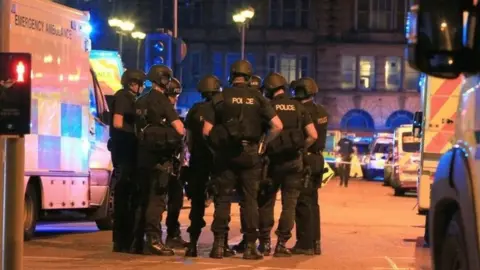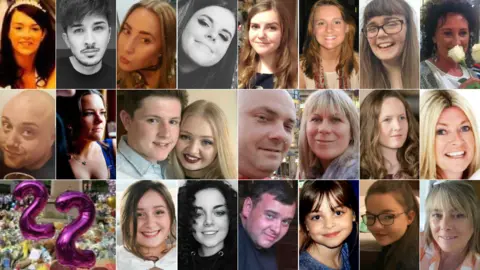Manchester Arena Inquiry: Reduced first aid training 'a deliberate choice'
 PA Media
PA MediaA police force which responded to the Manchester Arena bombing was not providing the recommended hours of first aid training at the time, the inquiry into the attack has heard.
The Manchester Arena Inquiry was told Greater Manchester Police (GMP) was not compliant between 2014 and 2020.
A senior GMP officer said it was a deliberate decision to provide six hours of training, instead of nine.
The hearing was also told officers did not get refresher training every year.
The inquiry heard that at the time of the May 2017 bombing, which killed 22 people and injured hundreds more, the Health and Safety Executive (HSE) recommended GMP provide nine hours of training on its first aid skills course and refresher training every year.
Temporary Assistant Chief Constable Wasim Chaudhry said it had been a deliberate choice and had been "a continuation of the training programme taking place prior to 2013".
He said the force was now compliant and offered additional training on the use of tourniquets as a result of "this inquiry and feedback through this inquiry from our staff in relation to the situation that they faced on the night".
 Family handouts
Family handoutsAssistant Chief Constable Iain Raphael from the College of Policing told the inquiry he believed his organisation, which is the professional body for those working in the police service, should have more powers to deal with a force which was not complying with first aid training requirements.
He said while GMP had since "made a policy decision, this length of time to achieve compliance feels too long".
"I think it would be useful if there were more teeth and more ability to guide compliance in this area," he added.
He also said the training recommendations for all forces were set to be changed to include first responder interventions, such as actions to stop catastrophic bleeding and open airways.
The hearing was told that move would come into force in January 2023.
Inquiry chairman Sir John Saunders said the officers that had given evidence "were really very keen" to have the training and "for them to be left in the same situation [until then], they might feel a bit let down".
Mr Raphael said the recommendations were already "operational requirements that any force right now can decide to do".
'Relatively simple techniques'
Lt Col Claire Park, a pre-hospital consultant who served as a British Army medic in Iraq and Afghanistan, earlier told the inquiry experienced doctors needed to be at the immediate scene of mass casualty incidents to give the best possible interventions to help save lives.
She said "in an ideal world", the person doing front-line triage "would be a senior consultant who has the ability to work out which of those patients do need those things".
She said that while the current specialist Hazardous Area Response Team paramedics had "a huge range of skills... in terms of very sick trauma patients, they may only see one or two a year compared to clinicians... who see that kind of patient on a daily basis".
The inquiry is exploring whether the UK should consider embedding experienced doctors with armed police units to allow them to treat casualties in the very early stages of a terrorist attack.
Col Park said the idea should be given "consideration" as it was "feasible", but said it "would require funding and training".
The system has been used successfully in France, including during the 2015 Bataclan Theatre attack in Paris when doctors treated casualties while police fought with gunmen.
The inquiry has heard UK national counter-terrorism police do not currently support the idea, but Col Park told the court she did not think the idea of adopting the model had been fully explored.
She also said basic life-saving skills should be taught in schools and "relatively simple techniques", such as stopping catastrophic bleeding and protecting an airway, should be shared with as many people as possible.
"They're skills that can save peoples' lives," she said.
Sir John adjourned the hearings until 14 February, when the inquiry will hear more evidence about the preventability of the attack.

Why not follow BBC North West on Facebook, Twitter and Instagram? You can also send story ideas to [email protected]
